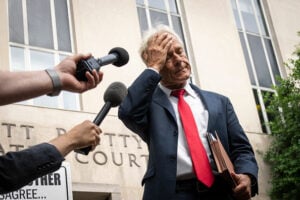[ad_1]

(Photo by Drew Angerer/Getty Images)
This afternoon, the US District Judge Amit Mehta handed former White House advisor Peter Navarro a plate of cold spaghetti in his effort to avoid trial for contempt of Congress. Trump’s econ crank flung many, many strands of pasta at the wall, hoping at least one would stick and get him off the hook after he refused to engage with the January 6 Select Committee. But Navarro was no more successful than his pal Steve Bannon, who engaged in a similar food fight with Trump appointee Judge Carl J. Nichols before being convicted of the same charge in July.
In fact, this entire case is shaping up as a retread of Bannon’s, albeit with somewhat less bombast, owing mostly to the differing styles of the two defendants’ lawyers: John Rowley and Stanley Brand are making the exact same arguments for Navarro that David Schoen and Evan Corcoran made for Bannon, just at lower decibel. But to no better effect!
In August, Navarro moved to dismiss the indictment making the same tired arguments about the committee being improperly constituted, lacking subpoena power, and having no legitimate legislative purpose that were already rejected by every other court, as it was today by Judge Mehta.
With even less evidence than Bannon, who had a letter from the former president’s counsel instructing him to “where appropriate, invoke any immunities and privileges he may have from compelled testimony in response to the subpoena” and “not produce any documents concerning privileged material,” Navarro claimed that he’d had a private conversation with Trump during which he was instructed to invoke executive privilege and refuse to engage with the Committee. Although, as the court noted, “Defendant offers no proof to support that assertion—he has offered neither a sworn affidavit nor testimony from him or the former President. His contention rests only on his counsel’s representations, which are not evidence.”
Having refused to dismiss the case, Judge Mehta turned to the government’s motion in limine to preclude Navarro asserting various defenses at trial. As with Bannon, Navarro will not be allowed to assert a claim of executive privilege as a defense to the contempt of Congress charge. Nor will he be allowed to claim immunity from congressional process as a former executive branch official, both because the subpoena referenced his plotting with Steve Bannon, which was clearly not part of his official duties, and because Navarro waived those defenses by failing to assert them before the Committee.
Ditto for all the “permission slip” defenses Bannon tried and failed to get in. No entrapment by estoppel, since Navarro can point to no memos from the Office of Legal Counsel which would “entrap” him into believing that he could simply throw up two middle fingers and defy a congressional subpoena and has not alleged that he relied on the ones he did cite. No public authority defense, because even if Trump had instructed him not to testify, he was then out of office and a private citizen. Nor will Navarro be allowed to argue selective prosecution or that the Committee had an obligation to engage directly with Trump regarding the invocation of privilege.
“What’s the point of going to trial if there are no defenses?” moaned David Schoen in July after being told once again that the court would not permit the arguments.
“Agreed,” nodded Judge Nichols.
And unsurprisingly, Judge Mehta has responded in exactly the same way as his colleague. Third verse, same as the first.
Navarro’s only victory was that he’s going to be able to force prosecutors to actually sing a stanza or two. Bannon famously promised to make his case “the misdemeanor from hell for Merrick Garland, Nancy Pelosi, and Joe Biden.” But he was foiled by Judge Nichols, who not only refused to subpoena internal Justice Department and congressional deliberations, but also blocked him putting then Speaker Pelosi and Committee Chair Bennie Thompson on the stand.
Seeking to head off a similar doomed play by Navarro, the government asked the court to “carefully guard against politicization during trial,” by precluding “general commentary on the political affiliations of Members of Congress” and using its “broad discretion to limit the Defendant’s cross examinations.” But Judge Mehta wasn’t willing to let the prosecutors phone it in, saying he’d address the issues in a pretrial conference.
So, congratulations, Doctor Navarro, you finally got one. Victory is sweet — even in very, very tiny bites.
US v. Navarro [Docket via Court Listener]
Liz Dye lives in Baltimore where she writes about law and politics.
[ad_2]




